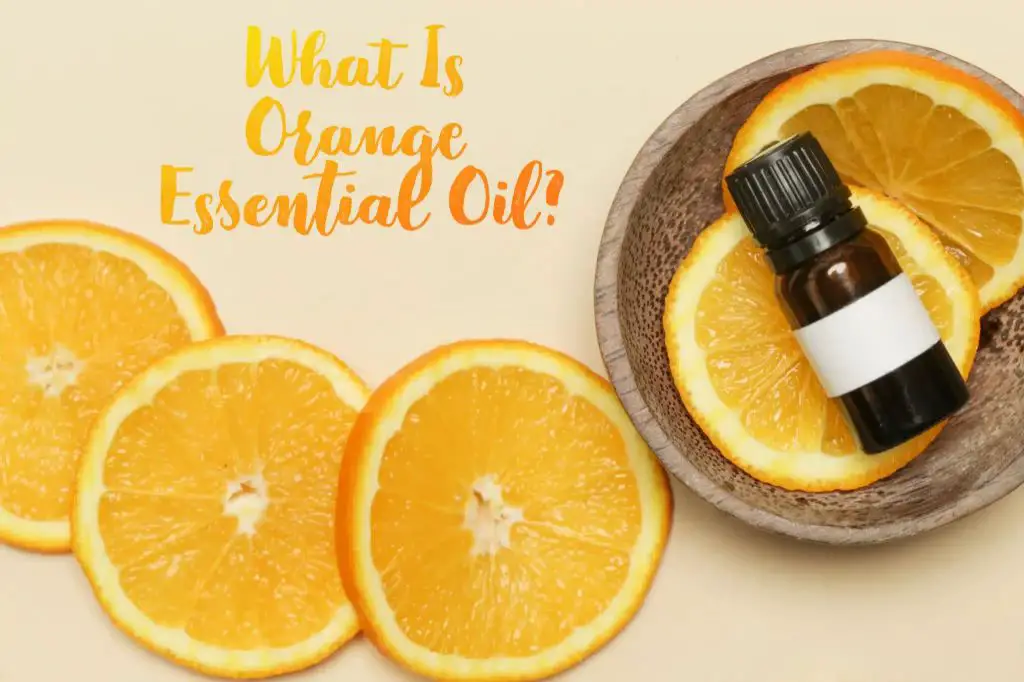Is Orange Oil Safe To Eat?
What is Orange Oil
Orange oil is an essential oil that is extracted from the rind of oranges, specifically the Seville orange variety. It is produced through a process called cold-pressing, where the outermost layer of the orange peels are pressed to extract the aromatic oil from the glands inside. This results in a concentrated, potent oil that contains a variety of active compounds.
Orange oil has a strong, fresh citrus scent and flavor. It is commonly used as a natural flavoring and fragrance in foods, beverages, cosmetics, aromatherapy, and cleaning products. When used in small doses, orange oil can provide a vibrant citrus taste and aroma without artificial additives. Due to its pleasant smell, it is also added to perfumes, soaps, candles, and other beauty products.
Some of the main uses for orange oil include:
- Flavoring in beverages, ice cream, baked goods, candy, etc.
- Fragrance in perfumes, lotions, soaps, candles, air fresheners
- Aromatherapy for its energizing and uplifting properties
- Household cleaner due to its antimicrobial effects
- Ingredient in DIY beauty products and home remedies
Active Compounds in Orange Oil
Orange oil contains several compounds that are responsible for its characteristic aroma and potential health benefits. The main active compound found in orange oil is d-limonene, which makes up over 90% of the oil
(wikipedia.org). D-limonene is a monocyclic monoterpene that gives citrus fruits their fresh, sweet orange scent. It has antioxidant, anti-inflammatory, and antimicrobial properties (Geraci et al., 2017).
Other active compounds found in smaller amounts in orange oil include:
- Myrcene – a monoterpene with analgesic, anti-inflammatory, and sedative effects
- Alpha-pinene – a monoterpene with anti-inflammatory and expectorant properties

Together, these compounds provide the potential medicinal and health benefits associated with orange oil. However, more research is still needed to fully understand the pharmacological mechanisms and safety of these active ingredients (Saini et al., 2022).
Potential Benefits of Orange Oil
Orange oil contains several active compounds that may provide health benefits. Some of the main potential benefits of orange oil include:
Antioxidant Properties
Orange oil is rich in antioxidants like vitamin C, flavonoids, and phenolic compounds. Antioxidants help protect cells against damage from unstable molecules called free radicals (source). Test tube studies show orange oil has strong antioxidant abilities and helps prevent oxidative stress (source).
Anti-inflammatory Effects
The antioxidants in orange oil may help fight inflammation. Inflammation is linked to chronic conditions like heart disease, diabetes, and autoimmune disorders. Animal studies demonstrate that orange oil exhibits anti-inflammatory properties (source).
Antimicrobial Effects
Research shows orange oil has antimicrobial and antifungal abilities against certain strains of bacteria, viruses, and fungi. The antimicrobial effects are attributed to active compounds like limonene (source). However, more studies are needed.
Potential Risks of Consuming Orange Oil
While orange oil is generally recognized as safe for food and cosmetic use, consuming high doses may lead to adverse side effects. The main risks associated with ingesting orange oil include:1
Toxicity at High Doses
Ingesting large amounts of orange oil may result in toxicity. Consuming more than the recommended dosage can lead to nausea, vomiting, and loss of appetite.2 Exceeding the maximum oral dose of orange oil is not advised.
Allergic Reactions
Some people may experience allergic reactions after ingesting or applying orange oil, especially those with sensitivities to citrus fruits. Symptoms like rashes, itching, swelling, and breathing difficulties may occur.3 Those with known citrus allergies should avoid using orange oil.
Drug Interactions
Orange oil can potentially interact with certain medications like sedatives and anticoagulants. It may also increase sun sensitivity when used topically. Speak to a doctor before using orange oil if taking any medications.3
Overall, while orange oil is generally safe in small culinary doses, caution should be exercised. Consult a healthcare provider before ingesting it, especially at higher levels.
Recommended Usage and Dosage
When using orange oil, it’s important to follow proper dosage guidelines to ensure safety. According to Dr. Axe, ingesting therapeutic-grade orange oil is generally considered safe, but only in small amounts. Typical oral dosages are:
- 1-2 drops diluted in 4 ounces of liquid
- 3-5 drops added to a bath
- 2-3 drops used topically by mixing with a carrier oil like coconut oil
Doterra recommends diluting 1 drop of orange oil in 4 ounces of liquid when ingesting internally. Woolzies states that orange oil should always be diluted before applying to skin at a ratio of 4-6 drops per 20ml of carrier oil.
When diffusing orange oil aromatically, both Doterra and Woolzies recommend using 3-5 drops in a standard diffuser. It’s important not to exceed the recommended dosages, as consuming large amounts of concentrated essential oils can potentially be toxic.
Pregnant women, children, and people with medical conditions should exercise additional caution and consult a doctor before using orange oil internally or topically.
Using Orange Oil in Cooking and Baking
Orange oil can be used to enhance the flavor of baked goods, desserts, and other recipes. Some popular ways to incorporate orange oil into cooking and baking include:
Recipes using orange oil:
- Orange olive oil cake – Replace 1/4 cup of oil or butter with 1-2 tsp orange oil for a light citrus flavor (Orange Essential Oil Recipes).
- Orange cookies – Add 1/2 tsp orange oil to sugar cookie or shortbread dough for a subtle citrusy taste.
- Orange pound cake – Use 2 tsp orange oil in place of 1/4 cup butter for a delightful orange pound cake.
- Orange frosting – Mix in 1/2-1 tsp orange oil into cream cheese or buttercream frosting.
Orange oil adds a bright, refreshing flavor to recipes without overpowering other ingredients. The oil contains delicate citrus notes that complement fruits, vanilla, spices, and nuts commonly used in baking.
Substitution amounts:
As a general rule, replace 1/4 cup of butter, oil, or extract with 1-2 tsp of orange oil in recipes. Start with less and add more orange oil to taste. Too much can create an unpleasantly strong orange flavor.
Orange oil enhances flavor while using less fat and calories than butter or oil. However, amounts should be limited since orange oil is very concentrated.
Alternatives to Orange Oil
There are several alternatives that can be used in place of orange oil. Many contain similar active phytochemicals like limonene, providing comparable flavor and aroma.
Lemon oil is one of the closest alternatives, containing high amounts of limonene like orange oil. Research shows lemon oil has antioxidant, antimicrobial, and anti-inflammatory properties similar to orange oil [1]. Lemon oil can be used for cooking, baking, cleaning, and aromatherapy.
Other citrus oils like lime, grapefruit, bergamot, and mandarin can also substitute for orange oil. They contain limonene and other phytochemicals that provide a bright, citrusy profile. Lime oil in particular makes a good replacement in culinary applications [2].
For essential oil uses, bergamot or tangerine oil can provide a similar uplifting aroma. They contain high amounts of limonene and have demonstrated relaxing and mood-enhancing effects [3].
Always source high-quality, food-grade oils when using as culinary substitutes. Essential oils should be diluted properly before topical use.
Consulting With a Healthcare Provider
Before consuming or applying orange oil, it’s important to consult with your healthcare provider to discuss potential risks, especially if you are taking medications or have any health conditions. Essential oils like orange oil can interact with certain medications, so your doctor can advise if using orange oil is safe for you (Healthline, 2022). They can also provide guidance on an appropriate dose and usage based on your individual health profile.
Pregnant and breastfeeding women should exercise particular caution with using orange oil and check with their doctor first. Orange oil may also interact with blood thinners, antidepressants, and cholesterol and blood pressure medications. Those undergoing chemotherapy or radiation treatment should also avoid using orange oil without medical approval (Draxe, 2023). Your doctor can help identify any potential medication interactions and contraindications specific to your health.
Overall, consulting a doctor provides personalized advice about using orange oil safely based on your medications, pregnancy status, and existing health conditions. This helps prevent potential risks and dangerous interactions with medications or treatments (Trusted Health Products, n.d.). It’s advised to discuss orange oil with a doctor before consuming or applying topically.
Sourcing High-Quality Orange Oil
When looking to purchase orange oil, it’s important to find a reputable source that provides pure, high-quality oil. Here are some tips for finding the best orange oil:
Look for 100% pure steam-distilled oil. Avoid oils diluted with carrier oils or “folding” agents. Pure orange oil should have the strong, fresh, citrusy aroma of oranges. It should be derived from the rind of Citrus sinensis oranges.
Seek out brands that source their oranges from reputable growers and disclose information about their distillation process. High-quality orange oil is extracted without the use of chemical solvents or high heat.
Look for oils that are certified organic and free of pesticides and other contaminants. Reputable brands will often provide third-party testing results to verify purity.
Avoid inexpensive, low-quality oils which are more likely to be diluted or contain synthetic compounds. Be wary of artificial orange flavorings or perfume-grade oils.
Purchase orange oil in dark bottles which protect against degradation from light exposure. Also check the expiration date and store the oil properly after opening.
Some examples of reputable orange oil brands include Aura Cacia, Plant Therapy, Eden Botanicals, and Mountain Rose Herbs. Checking reviews can help identify trusted suppliers and high-quality oils.
The Bottom Line
To summarize, orange oil contains beneficial compounds like limonene that can provide health benefits when used appropriately. However, consuming large amounts of orange oil, especially undiluted, may pose certain risks. While orange oil is sometimes used as a flavoring, it’s best to use sparingly in food and consult a doctor before taking it as a supplement. When purchasing, look for 100% pure, food-grade orange oil from a reputable source.
Overall, using small amounts of orange oil in cooking is likely safe for most people. But anything beyond light culinary use or diffusing for aromatherapy should be discussed with your healthcare provider. While orange oil does have some promising medicinal uses, it’s always better to err on the side of caution with concentrated extracts. Dilute orange oil properly, avoid long-term high dose supplementation, and focus on getting nutrition from whole oranges and other citrus fruits instead.




